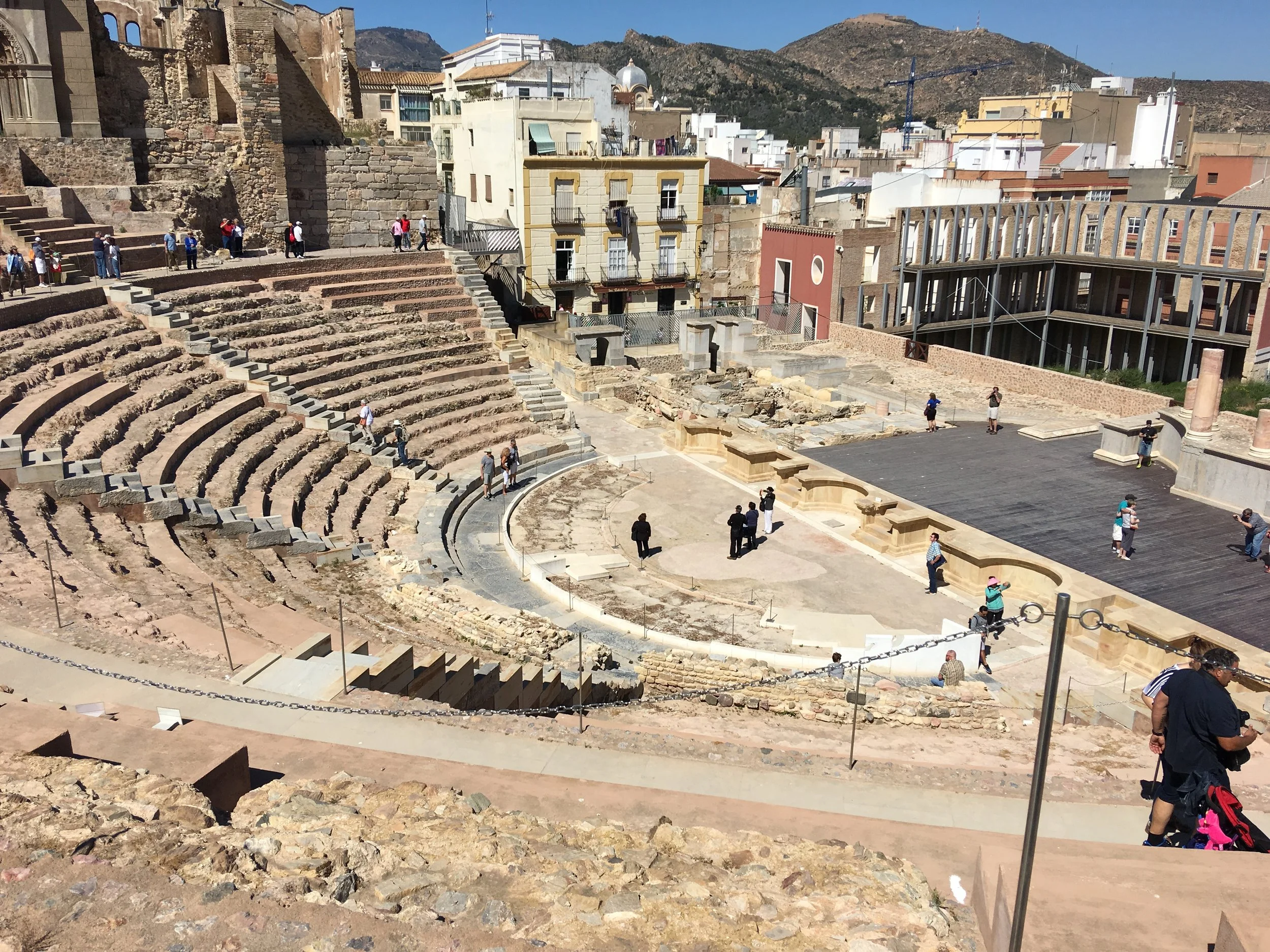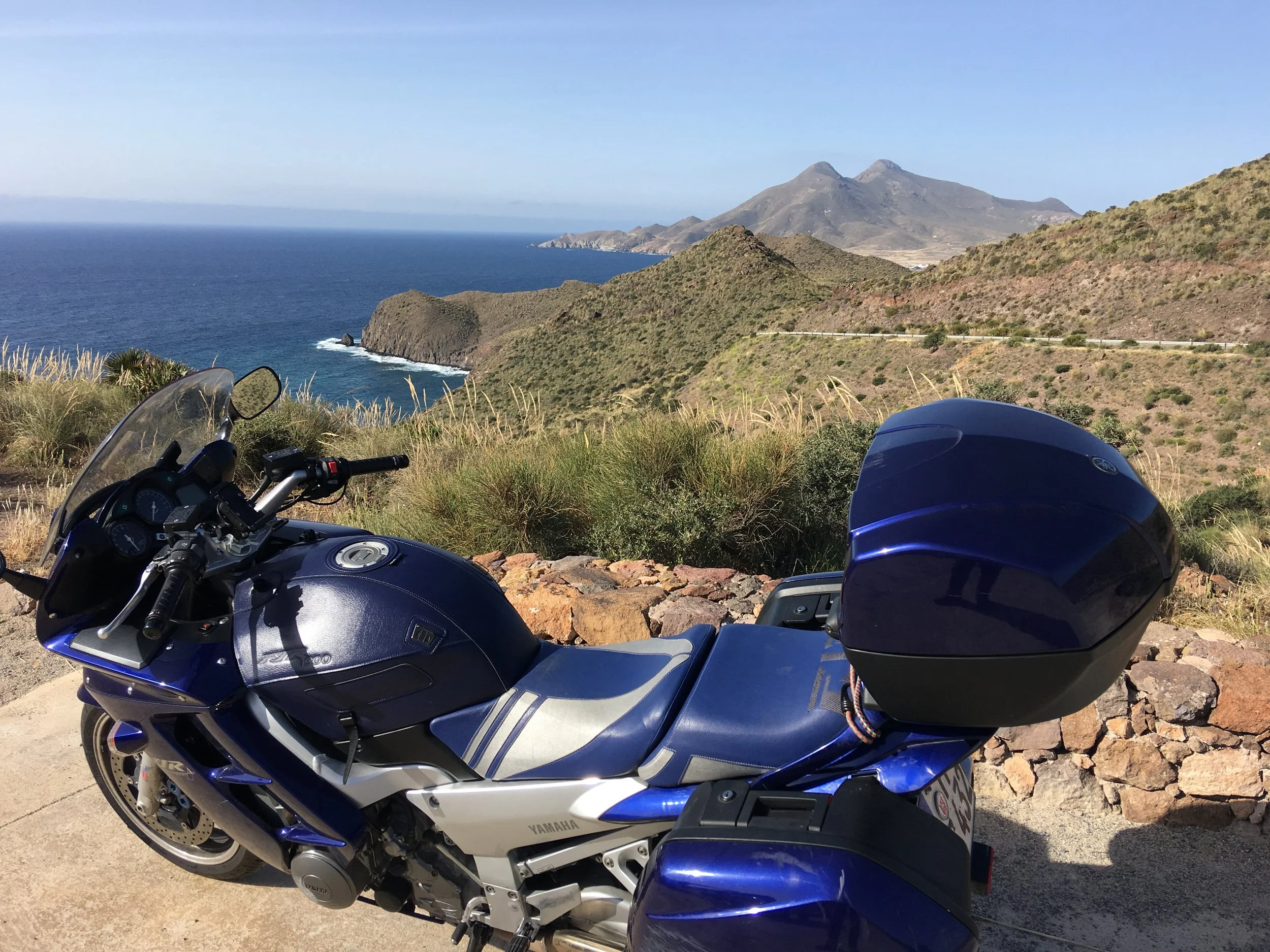Spanish Motorcycle Diaries - Day 2. From Alicante via Cartagena to Cabo de Gata. (May 2017)
Driving along the coast this morning, one holiday retail development after another. Salt flats interspersed with white salt mountains, before passing all of modern tourism’s apparent must-have’s, go karting, minigolf, shopping malls, dodgy clubs, real estate billboards in Russian (but not (yet) in Chinese), globalization has arrived in every crook and nanny, for better or worse. Once in a while a flock of sheep that looks out of place and out of time. The coastline is completely plastered with holiday homes, there must not be a word in Spanish for ‘overdevelopment’. A very mixed sight to behold, for there is still a marvelous coastline and imposing mountains running in parallel.
Around Murcia, the countryside turns flat. (It’s local PP governor just had to resign following a familiarly-sounding Spanish real estate corruption scandal; plus ca change ....) Located between distant mountains ranges, you have a giant paella pan, heating up in the summer and spring, and covered from one end to the other in plastic greenhouses: Europe’s vegetable gardens. It looks as if Romanian performance artist Christo, who has wrapped the Reichstag and Brooklyn Bridge amongst others, has wrapped a whole region in white plastic foil – permanently! The unsightly spectacle repeats near Cartagena, near the Cabo de Gata, and around Almeria – haven’t done the maths but the grand total of covered greenhouses must approximate the landmass of a small country like Belgium; the seasonal agricultural workers from North Africa also cover their destitute barracks in the white plastic … In February, when it snowed here for the first time in 20 years, English supermarkets ran out of broccoli, or was it cauliflower? Back onto the motorway to skip quickly past this efficient agribusiness set-up.
And then the human-made reward of the day: Cartagena. In ancient times known as the New Carthago, since it was founded in 227 BC by the trading nation of Phoenician origin that called Carthage their home, and which the Romans referred to as the Punic. Those of Hannibal’s fame, the warrior that took on Rome in 218 BC, marching his armies along the coasts of North Africa, Spain, France, and into Italy, forcing his hordes of elephants across the Alps (and duly whipping the Romans). Talk about determination. Talk about focus. Compare his attention span to that of Trump, for lack of a better example …
Well, the Romans, like most empires, did not much like competition. So they send out Scipio Africanus, who conquered modern-day Cartagena in 209 BC and won the 2nd Punic War in 201 BC (subsequently wiping Carthage off the North African map (located in modern Tunisia). On his way home, he settled his veterans near Seville, but also found time to ensure that the new Cartage became a large town in its own right, a Roman town.
Ever since I had the privilege of spending one semester at LUISS university in Rome, in 1990, thanks to the EU’s Erasmus programme, jointly with my friends Axel K., Gianpaolo and Eugenio R. (all UWC alumni, not a coincidence), I have been a sucker for Roman history and lifestyle; and the monuments that this longest-lasting European empire built for eternity, its aqueducts still visible and standing in Lucca and many places, its theatres and fora, its legal principles still the stuff taught in law101 today. Cartagena was treated like Roman royalty, its marvelous 7,000 seat theatre built from Italian Carrara marble, but it was hidden until the 19th century under many layers of civilisation’s accomplishments after the demise of Rome.
[A propos Erasmus: One of the cornerstones of what the EU is about. Bringing people together, fostering understanding and tolerance. Making friends. – Does anybody think 20th century jingoism would have led to the two world wars, if the French/German/British/Austrians/Italians had each studied in each other’s countries and had many friends connected on FB and whatsapp in those countries, speaking their languages and being familiar with their customs and idiosyncrasies? What price do you put on that? I’ll take a little bureaucracy and fumbling decision-making any day for that.]
My father had studied Greek and Latin, but had never found the time to tell me why. I wish he had. I always wondered why British kids studied ‘classics’ at university, and only recently understood; my youngest daughter Lea and Natalia’s boyfriend have. Without the Greeks and Romans, their philosophers and statesmen (and what we learned from Mesopotamia and Egypt before that), homo sapiens might as well still be a cave man, a primitive Viking or Visigoth. The renaissance and enlightenment reminded us of that cultural heritage, and developed its principles and thoughts. Had he taken the trouble to explain, it might have all turned out different … I might have become a Professor of Ancient History, and not one more economist, one more banker, plying his trade.
[One of my 20th century heroes is Ernst Gombrich, who as a 26-year old in 1935 was an unemployed academic who had written letters to the daughter of friends explaining his doctoral dissertation in terms a child could understand. In 1926, he was asked by an editor to write a short history of the world for children, and given an impossible deadline. He was one of those erudite polymaths from the educated, Jewish, Viennese society that found no intellectual challenge too much. And so he set about: reading in the morning in his parents’ library on the epoch of the day, in the city’s municipal library in the afternoon, and writing the chapter in the evening. Day in, day out, and after a mere 6 weeks, he produced a marvelous small book that I consider to this day to be the best comprehensive history of mankind, and not just for kids. So if you are wondering what to read to your children in the evening to get them away from their mobiles and tablets, here’s a secret tip: Little History of the World. He left Vienna in the 1930s for the UK, and enriched that country and its academics, sparring inter alia with Karl Popper, another Jewish émigré from Vienna, at my alma mater, the LSE. (Ah, refugees and immigrants, a real drain on the host country ….)]
Spain got many things right, in terms of application of the EU funds to play catch up, to generate convergence, as the economist say. Motorways that would be the envy of Germany and France, modernized municipalities, renovated old towns, architectural marvels, gleaming airports (incl. some white elephants), spanking new universities, and wonderful museums. Cartage’s Roman Museum is no different, created by noted Spanish architect Rafal Moneo. Don’t take my word for it, it boasts an impressive virtual tour that you can take; see the link below:
http://wwwe.cartagena.es/TeatroRomanoVisitaVirtual/index.html
Europe is under siege, decried as ineffective and overreaching. From the likes of the copycat self-confessed ‘bloody difficult woman’ in London (we demonstrated at LSE against the original in the early 1990s, Maggie Maggie Maggie!, Out Out Out!), the wolf-in-sheep skin authoritarian LePen, the pathological Kaczynski, the dictatorial Orbans and Erdogans of this world, Putin, Trump, … well, just take a number and get in line. And yet, as a long-time inhabitant of Poland and a recent one of Spain, you wonder. There is no counterfactual, of course, but where would these countries be today without the acquis communitaire, without the rules, due process, governance, and guiding principles that they had to comply with to be able to join the club? Would Spain’s transicion from Francoism to a functioning modern democracy have gone so smoothly without the ultimate prize of EU membership? Where would they be without the many billions of euros paid in structural assistance to foster catch-up, and convergence of living standards? Was Europe wrong not to deny the dozen or so East European nations the right to join the EU (and NATO) in 2004, in order to have a chance at civilizational catch-up, after 50+ years behind the stifling Iron Curtain? That created a governance nightmare in Brussels, which has still not been solved. But should we have left them with Belarus and Ukraine, the Ukraine where Putin does what he likes in the Crimea and the Donbas?
And now we are faced with the ingratitude and immaturity of those polities, electing populists on anti-EU platforms. My father was a wisecrack who had a saying for nearly every situation in life -- and they are indelibly inched in the memory of his children – he would have said: ‘Erst kommt das Fressen, und dann die Moral.’ Freely translated: economics first, ethics later. So maybe it is asking too much for these societies to show tolerance to refugees from other cultural and religious backgrounds, the willingness to help those in need? Germany’s president was only recently able to say that ‘Islam is part of Germany’, more than three generations since the end of WW2. Maybe we are asking too much of the Poles and Hungarians. You can build motorways quickly, but not change people as quickly.
I closed out the day by making my way to the south-easternmost point in Spain, a wondrous mountainous steppe-like area including a national park known as Cabo de Gata; following, as usual in our exploits of Spain, the good recommendation of my Barcelona-based friend Robbie. The motorway down there, an extension of the AP-7, did not exist 8 years ago according to my aged Garmin; and on a 100km stretch, I counted less cars than fingers on 3 hands ... It is located in Andalucía, a major recipient of EU structural funds; its regional boss, Susanna Diaz, is likely to win the PSOE primaries and take over from hapless Rajoy as PM of Spain at the next national elections – and the bring her ‘expertise’ to bear at the national level.
Hasta la vista.








